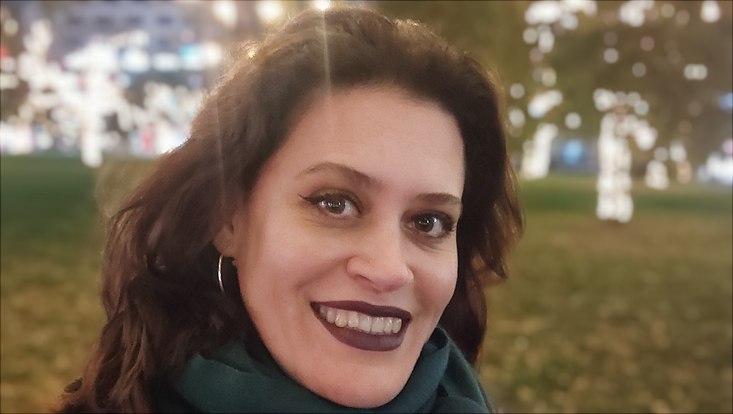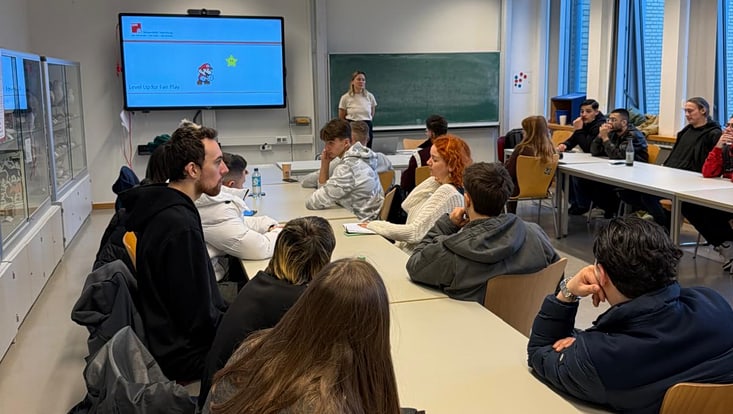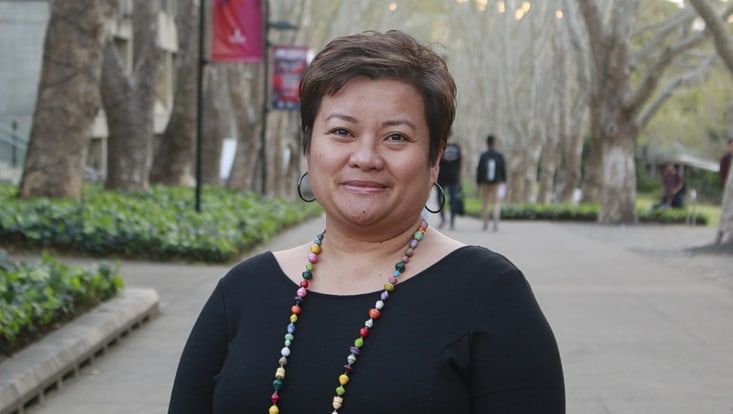“I think now that a musical score is an algorithm.”
19 December 2022

Photo: Priscilla Prueter
Priscilla Prueter studied Music at the Universidade Tecnológica Federal de Paraná in Brazil. She joined the Faculty of Education at Universität Hamburg in October 2022 and will be working towards her doctorate the next four years. We asked Ms Prueter some questions to find out more about her arrival in Hamburg and her research.
Faculty of Education: Ms Prueter, what was your first impression of the city of Hamburg?
Prueter: The weather is actually quite similar to where I’m from, where we have less sun than London. That makes me feel right at home. I arrived in this golden October, which was really fantastic. Oh, and I really like how easy it is to meet people from different countries. My favorite place so far is the Fischmarkt.
This isn’t your first brush with Germany. You’ve been part of an award-winning team in the EdTech Hackathon, focusing on the development of an application for teaching music in an accessible manner.
Yes. The DWIH and DAAD have initiatives to connect Germany and Brazil. The amazing thing about this hackathon is that it brings together not only programmers, but also musicians, educators, designers, and more.
And your background is originally in music.
Yes, my first degree was in music. Then I decided to become a music teacher, went deeper into education—learned my Piaget, my Vygotsky—and then I’ve decided to come back to music itself. Now I have a background in both fields.
A lot of your work is focused on modern, digital types of teaching.
In 2017, I took on a job where I was now responsible for 13 different campuses. I quickly realized that I could not handle them all in a traditional way, so I turned to Google and found their Google Teacher Center. I started taking the first steps immediately, improved my digital skills, and connected with educators working on educational technology worldwide. I was selected to be a Google Innovator to develop a project that included music education and technology. Music education is often very traditional: you have the teacher, the piano, and the student. This kind of education is very expensive, but if you do not have money for a piano, perhaps you can use your smartphone or other virtual tool? It’s a way to bring music education to more people.
That would explain why at Universität Hamburg, you are situated at Computer Science Education and not Music Education.
In academia, you can either focus narrowly on one topic or broaden your areas of interest. I have been working with choirs for 20 years, so I decided it is time for me to open myself to new things. During my stint with the Google Innovator program, I joined some programming courses and it felt great seeing my code working. And then it hit me: I wanted to bring the languages of music and programming together. There already are some development environments for programmers that are particularly focused on music production, such as Earsketch and Sonic-Pi, and beyond that a few other approaches to merge computer and music science.
And what is your approach in your research?
I am going to teach a high school choir how to code! We are going to learn to sing a song, and after understanding and experiencing the structure, we are going to code that music. Musical notation is actually not that different from programming; you have loops, you have conditions. I think now that a musical score is an algorithm.

That is fascinating! Final question: why should Brazilian educators come to Germany and vice versa?
In the last couple of years, I feel like appreciation for educators has dropped sharply in Brazil—same goes for federal funding. On the other hand, in Brazil, our system is different; the conditions are different; the structure is different. In such a different environment, you will have to find yourself as a new person and the way you look at things will never be the same. When we confront other places like that, we can see more clearly how we can improve. And then we can grow together.
As an aside, did you know we had a large migration of German families to Brazil from the mid-1800s? We have cities where you can still conduct business at a bank in German!
Priscilla Prueter just published her first book, „Com Maestria: preparação e estratégias para o Canto Coral” (“Preparation and Strategies for Singing in Choirs") in Brazil.


